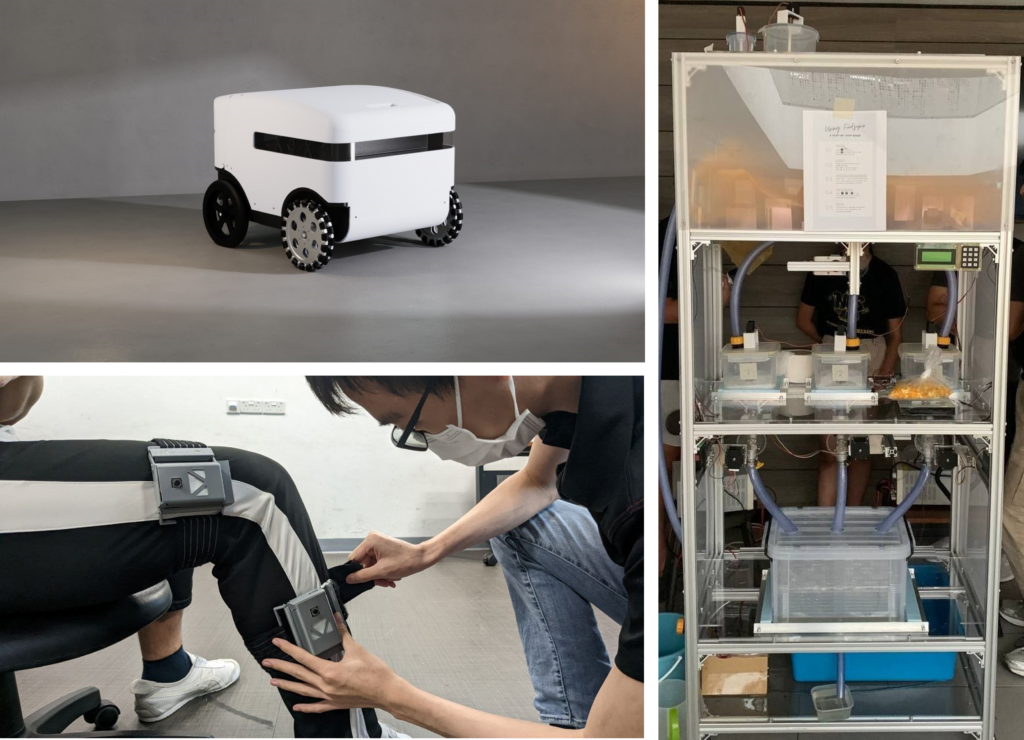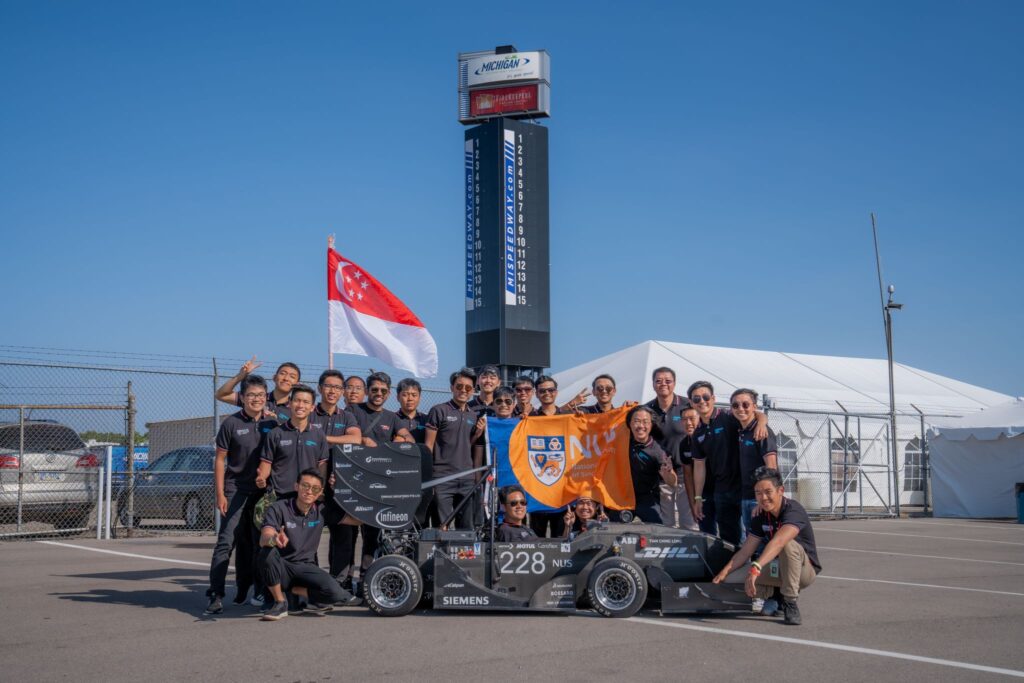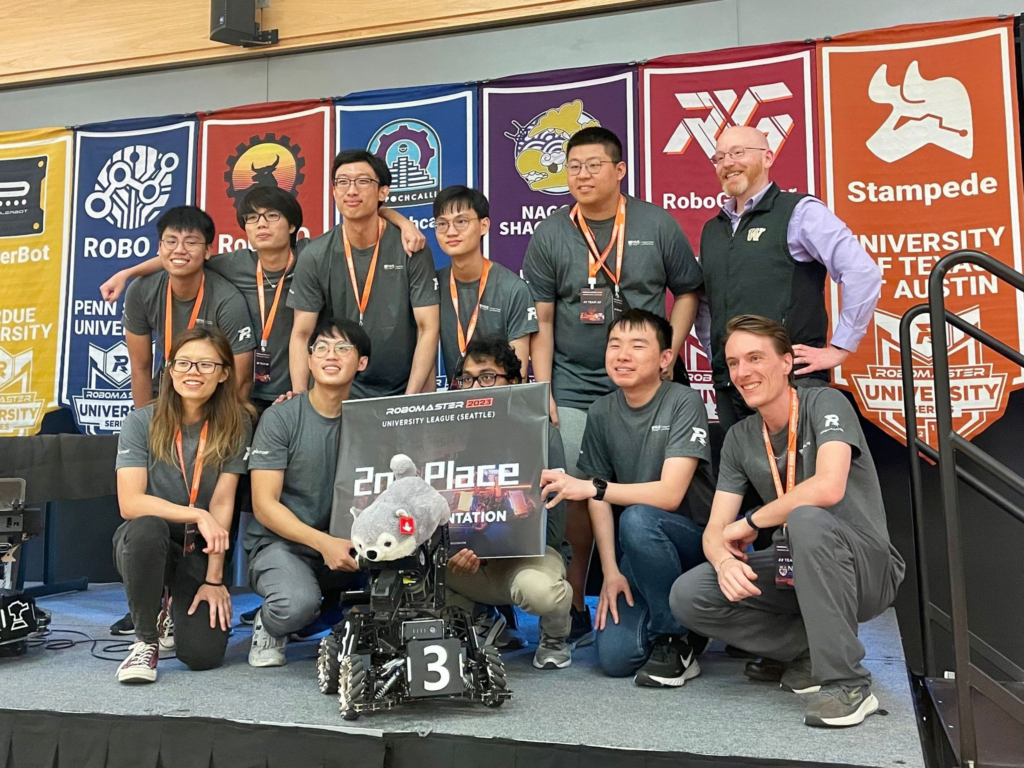Congratulations to our iDP students who won this year’s College of Design and Engineering (CDE) Innovation & Research Award (High Achievement) and the NUS Outstanding Undergraduate Researcher Prize! Their winning entries, covering a broad range of topics such as healthcare, sustainability, and intelligent systems, were their projects from EG3301R Ideas to Proof-of-Concept which were completed between January and November 2022.
Development of physiotherapy aid for group physiotherapy
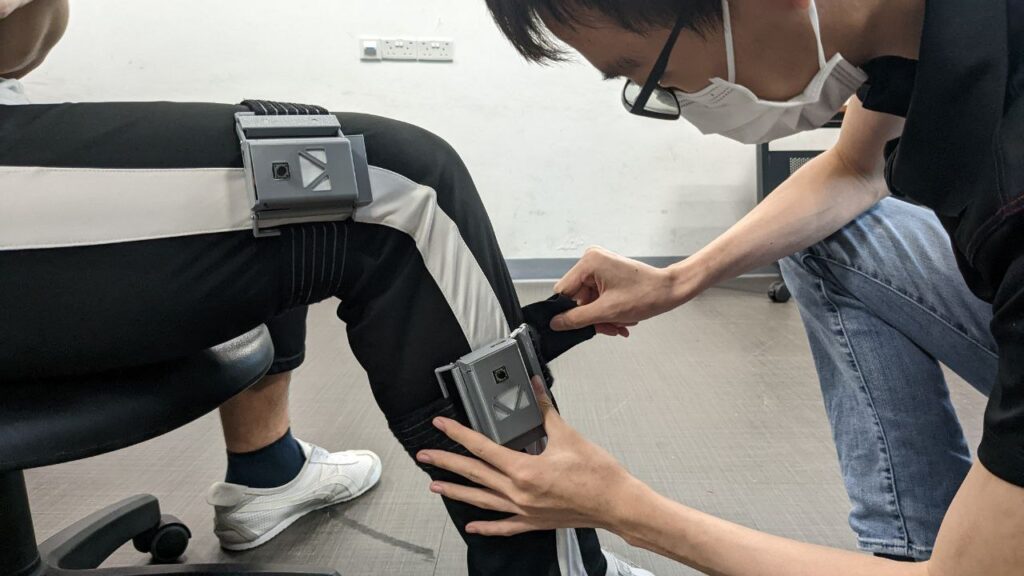
The increasing occurrence of knee osteoarthritis and Physiotherapy to treat it has put a manpower stain on physiotherapists. Group physiotherapy is a potential solution to alleviate the manpower issue. Focusing on maintaining the quality of physiotherapy in a group setting, this project team developed a system of knee wearable devices to accurately monitor the knee joint angle of multiple patients in real-time. Working closely with physiotherapists, the team developed a working prototype which can accurately monitor three patients simultaneously during therapy.
Project team members
-
- Gabriel Wong Kong Yee (Biomedical Engineering, Class of 2024)
- Joy Lee Hsin Yee (Biomedical Engineering, Class of 2024)
- Ryan Tan Cheng Lee (Biomedical Engineering, Class of 2024)
- Sim Ee En, Ian (Materials Science & Engineering, Class of 2024)
- Yow Keng Yee, Samuel (Mechanical Engineering, Class of 2024)
Project supervisor
- Dr Tang Kok Zuea (kz.tang@nus.edu.sg)
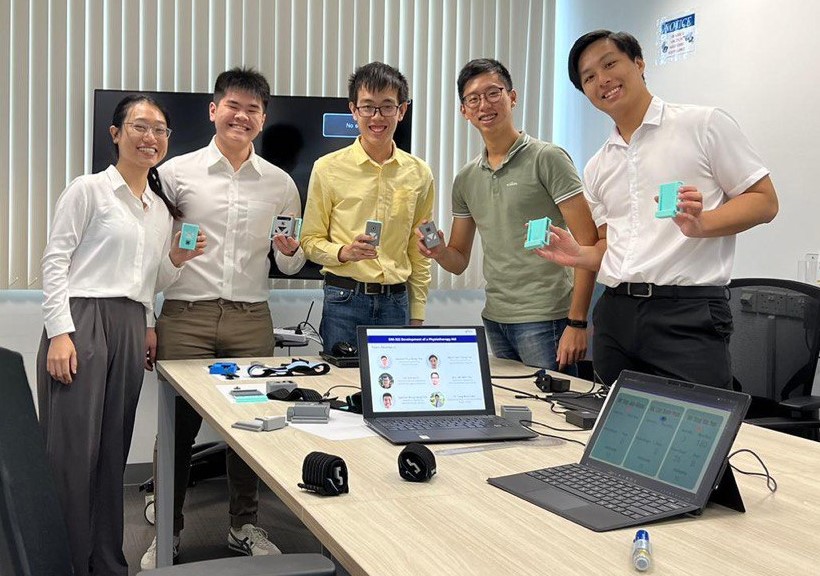
“It was an incredible experience to iterate on our product while testing it with physiotherapists. We could see how our engineering design changes improved the experience of patients and physiotherapists.”
Yow Keng Yee, Samuel
Box on Bot (BoB)
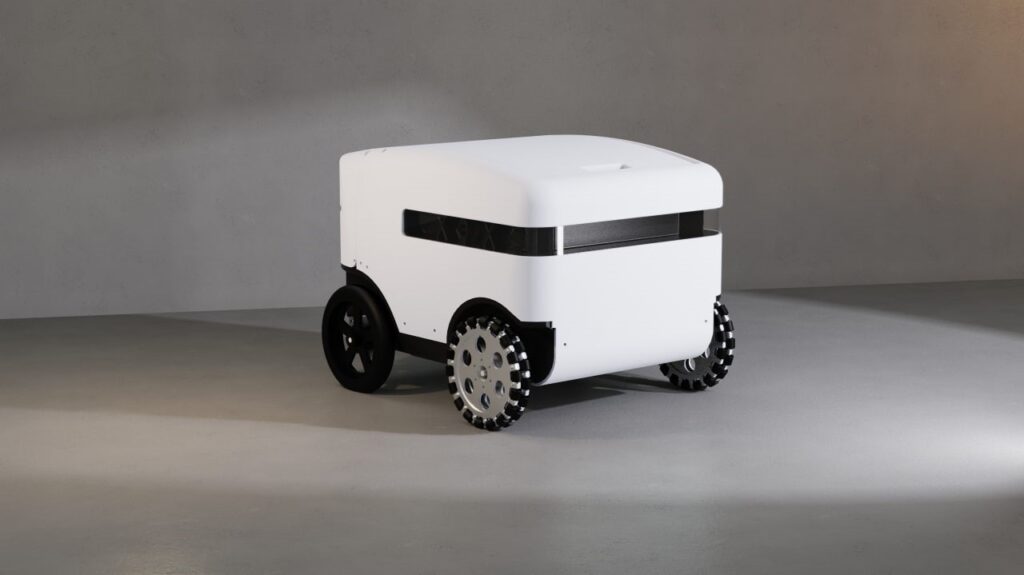
BoB is an innovative last mile delivery robot designed for Singapore’s GNSS innovation challenge. With AI capabilities, it offers a maintainable, scalable, and cost-effective solution suitable for mass production. BoB is equipped with ultrasonic sensors, stereo cameras, IMU, GNSS, and SLAM technology, ensuring autonomous navigation in urban environments. This advanced robot aims to tackle the challenges of urban delivery, prioritizing delivery speed and handling high volumes efficiently. By implementing a fleet of BoBs, the food delivery industry can undergo a significant transformation, effectively meeting the demands of densely populated areas like Singapore.
This project also won the Grand Prize at the GNSS Innovation Challenge 2022.
Project team members
-
- Bui Quang Huy (Electrical Engineering, Class of 2024)
- Chin Zheng Hao (Mechanical Engineering, Class of 2024)
- Ching Jaymi Mae Lim (Engineering Science, Class of 2024)
- Jasshan Kumeresh (Electrical Engineering, Class of 2024)
- Koh Yang Kai (Mechanical Engineering, Class of 2024)
Project supervisor
- Mr Eugene Ee (wheee@nus.edu.sg)
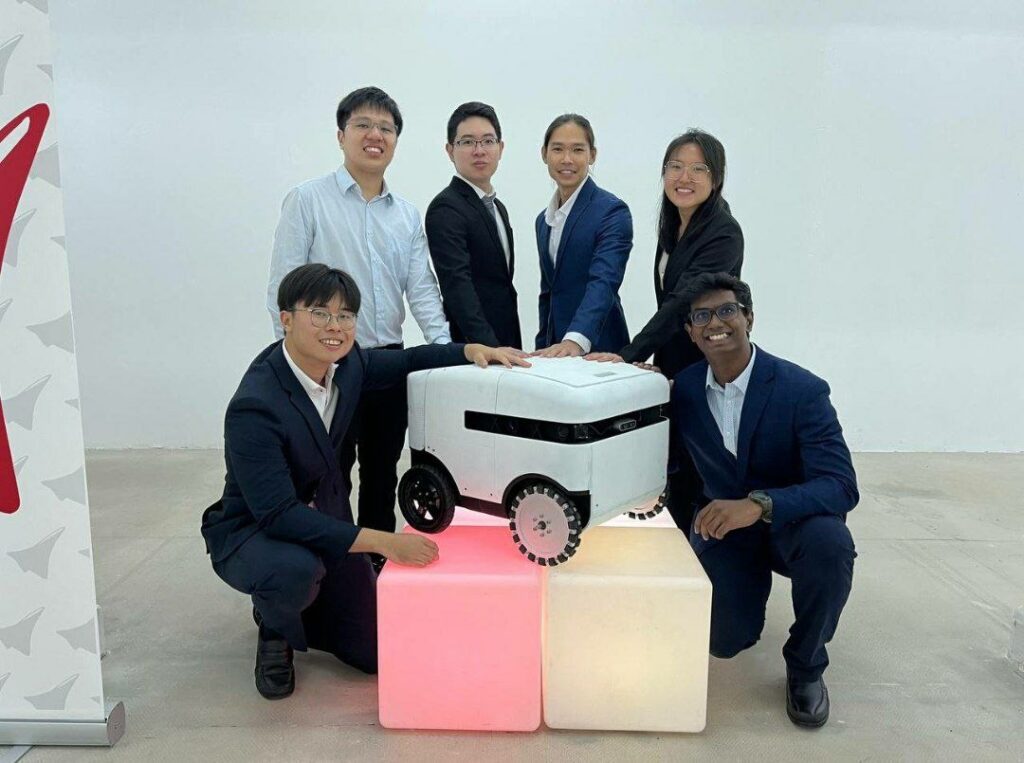
“A challenge that we faced during the project is the integration and synchronization of multiple complex technologies and systems within BoB. Incorporating ultrasonic sensors, stereo cameras, IMU, GNSS, and SLAM technology requires careful coordination to ensure smooth operation and reliable performance. The integration process may involve addressing compatibility issues, optimizing data fusion algorithms, and fine-tuning the interaction between different components.”
Ching Jaymi Mae Lim
Conversion of household food waste to eco-enzyme
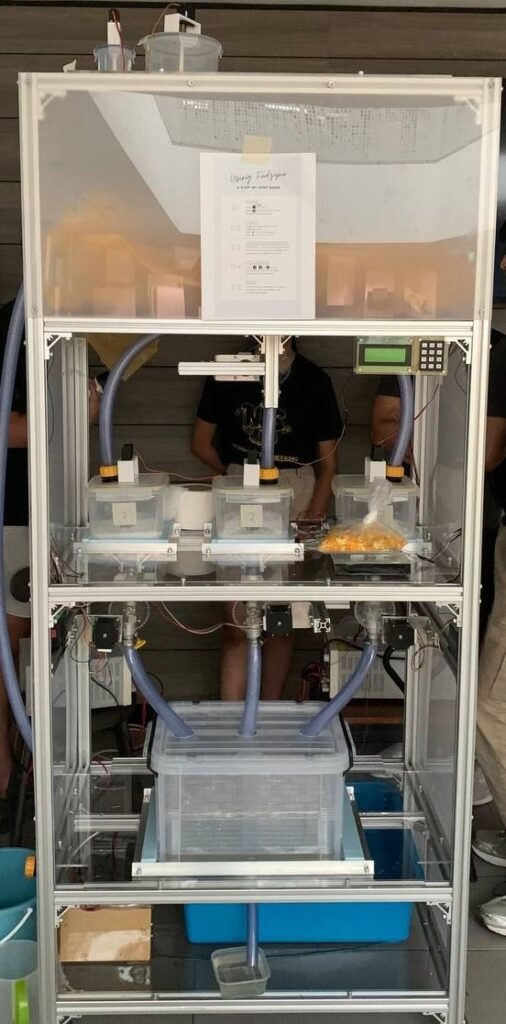
Singapore faces a significant food waste problem, and the domestic sector is the leading contributor to this issue. Yet, present food waste recycling methods are inadequate and inconvenient for individuals. This project aims to upcycle food waste into a value-added output – eco-enzyme – through automation, thereby empowering residential communities to upcycle their food waste. The envisioned solution is a “vending machine-like” system that allows residents to deposit their food waste, which is then automatically processed into eco-enzyme. Compared to other products upcycled from food waste, eco-enzyme is a versatile cleaning solution that allows Singaporeans to reap the rewards of their efforts when they upcycle their food waste. Furthermore, the by-product of the process can also be used as compost by community gardens. This project thus aims to be a step forward towards achieving a more sustainable food waste management strategy in Singapore’s residential estates through leveraging technology to inculcate food waste upcycling habits.
Project team members
-
- Aishwarya Radhakrishnan Nair (Computer Science, Class of 2024)
- Htet Htlan Htay (Chemical Engineering, Class of 2024)
- Ong Qingzhe (Mechanical Engineering, Class of 2024)
- Tay Yu Tian Danielle (Mechanical Engineering, Class of 2024)
- Trivedi Harsh Nilesh (Chemical Engineering, Class of 2024)
Project supervisor
- Dr Elliot Law (elliot.law@nus.edu.sg)
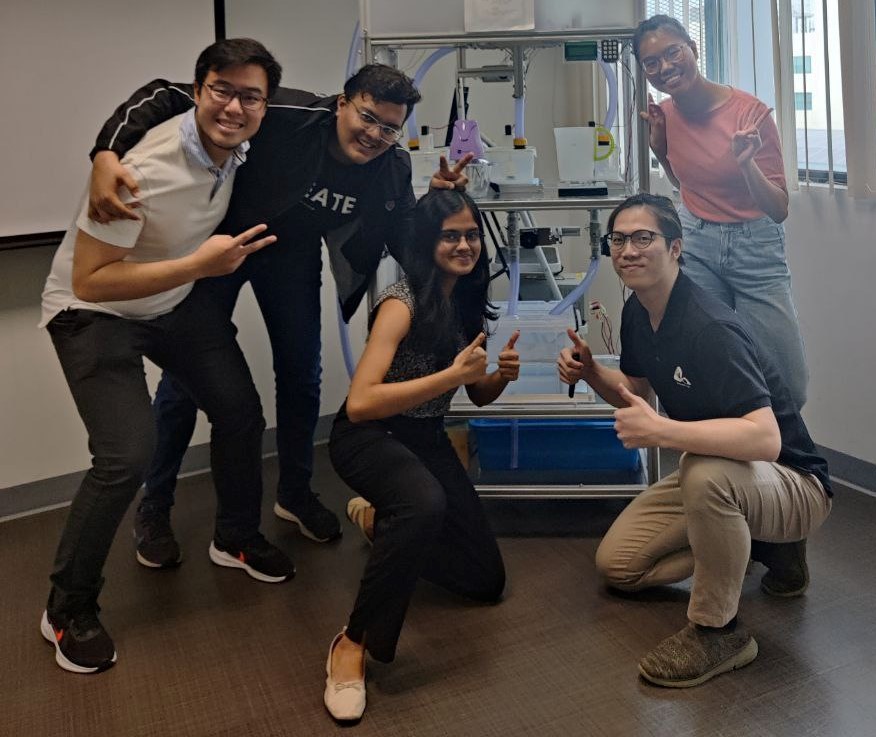
“The task of creating a universally applicable solution presented a significant challenge due to the novelty of the machine and lack of existing technological references. While the current prototype needs further refinement to achieve commercial viability and user appeal, it represents an important step forward in food waste recycling, setting a precedent for future similar endeavours.”
Htet Htlan Htay


